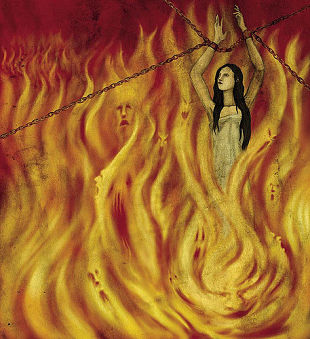The Lonely Soul: Exploring the Anima Sola Phenomenon
Within the tapestry of Latin American folk religion, a captivating figure emerges, shrouded in mystery and revered with both fear and devotion: the Anima Sola, or Lonely Soul. Depicted as a suffering woman bound in chains, engulfed in flames, her image evokes a potent mix of emotions and begs the question: who is this enigmatic figure, and what does she represent?
The Anima Sola is not merely a static image; she embodies a complex narrative woven from threads of Catholic tradition, African spirituality, and indigenous beliefs. To truly understand the Anima Sola is to embark on a journey through layers of cultural syncretism, where faith intertwines with folklore, and the boundaries between the spiritual and the earthly blur.
Our exploration takes us to the heart of personal struggles and desires. The Anima Sola, despite her tormented depiction, is not an object of fear, but rather a beacon of hope, a powerful intercessor for those facing seemingly insurmountable obstacles. She becomes a conduit for the pleas of the desperate, the heartbroken, and the imprisoned, offering solace and the promise of divine intervention.
However, the Anima Sola is not without controversy. Her unorthodox veneration outside the official Catholic Church, combined with her association with darker aspects of faith like curses and hexes, has drawn criticism and fueled debates about the true nature of her power. Is she a benevolent force for good or a conduit for potentially dangerous spiritual practices?
This exploration seeks to unravel these complexities, delving into the rich history, symbolism, and cultural significance of the Anima Sola. We will navigate the diverse perspectives surrounding her veneration, examining both the reverence she inspires and the controversies she ignites. Join us as we journey into the heart of this enduring folk tradition, where faith and folklore converge, and the power of belief transcends the earthly realm.
To delve into the history of the Anima Sola is to trace the footsteps of cultural exchange and religious syncretism. Her origins are often linked to a passage in the biblical Book of Maccabees, narrating the story of a woman condemned to burn for eternity as punishment for her sins. This narrative, absorbed into Catholic tradition, laid the foundation for the visual imagery associated with the Anima Sola.
However, her evolution extends beyond Catholic doctrine, incorporating elements of African and indigenous beliefs that traveled across the Atlantic during the transatlantic slave trade. In these cultural exchanges, the Anima Sola found resonance with spirits associated with suffering, liberation, and justice, her image transformed into a symbol of resilience and the yearning for freedom from oppression.
This fusion of beliefs solidified the Anima Sola's position within Latin American folk Catholicism, not just as a figure of suffering, but as a powerful intercessor, particularly for those seeking her favor in matters of love, legal battles, and protection from harm.
The controversy surrounding the Anima Sola stems from this very power and the unorthodox nature of her veneration. Critics, primarily within the Catholic Church, view the practices associated with her as bordering on superstition and potentially opening the door to harmful spiritual influences. The use of candles, offerings, and even petitions written on her image are seen as straying from sanctioned religious practices.
Despite these criticisms, the devotion to the Anima Sola persists, a testament to her enduring presence within the hearts and homes of countless individuals. For her devotees, she represents not a challenge to faith but rather an alternative avenue for connecting with the divine, a testament to the enduring power of folk beliefs and the human need for solace and hope, even in the face of adversity.
The purrfect escape finding joy in cute anime cat wallpaper
Coles county il jail roster
Grin crossword clue danword














